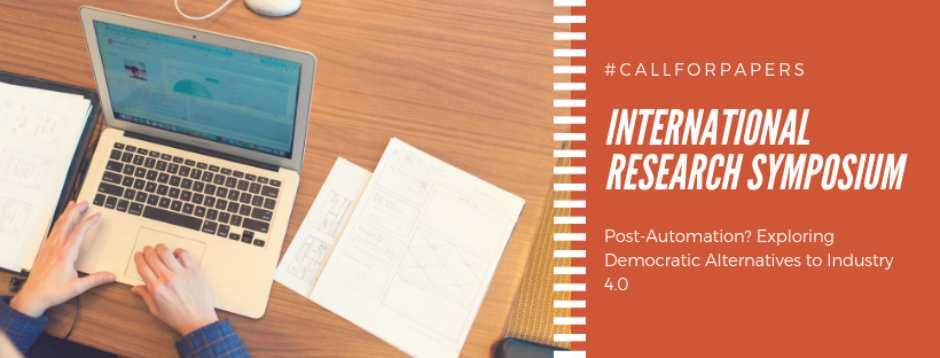International Research Symposium
Post-Automation? Exploring Democratic Alternatives to Industry 4.0
11-13 September 2019
Science Policy Research Unit (SPRU), University of Sussex, Brighton, UK
About the Symposium
We are delighted to invite proposals for papers for the International Research Symposium on Post-Automation? Towards Democratic Alternatives to Industry 4.0, taking place at the Science Policy Research Unit, University of Sussex, 11-13 September 2019. The Symposium will explore the idea of post-automation, critically and constructively. Theoretically-informed and empirically-grounded papers that address what a “post-automation” vantage point might bring to ongoing debates are welcomed. Papers may discuss the following issues: how societies produce and consume – in light of social concern for sustainable developments: dignified work and social justice and democratic technology; a business-led push for Industry 4.0; and the circular economy.
An Interdisciplinary Call-Who Should Submit
This call is an invitation for diversity and plurality. Applicants from PhD students to senior Professors are welcome from science and technology studies, sociology of work, social anthropology, engineering, innovation studies, design, geography, sustainability studies, and other relevant areas. The key is to provide an explanation of how your proposed paper can contribute to an open, engaged and collaborative exploration of the idea of post-automation, and to see what work can and cannot be made of that idea. You can propose questions (and answers) that you think should be central to a post-automation research agenda. These might include, for example:
- How can post-automation alter perspectives, understandings and practices in technology-society relations?
- What methods can bring insight, facilitate dialogue, and assist developments in post-automation across the scales of projects, workshops, sectors and societies?
- How is post-automation manifesting in different places and circulating between places, for example across the global North and global South?
- How might social theory in post-automation reframe public debate and move policy beyond reactions to automation, and into proactive alternatives for sustainable technology-society relations?
- How post-automation might help to re-imagine an economy based on commons goods?
How to Apply
1. Please send a 500-word maximum paper abstract and 100-word bio for each author (including contact details and affiliation) as a single document. In both sections, please explain how you relate and contribute to the idea of post-automation. Please email your abstracts as a Word file to [email protected] stating the Symposium title in the subject area of the email. The deadline for abstracts and bios is 20 March 2019.
2. Selected participants will be required to produce a 4,000-5,000 word paper in advance of the Symposium by 15 July 2019 and present it for discussion there. At the Symposium we will read and discuss all the papers, and there will be group activities that map and explore emerging themes.
3. The Symposium will run from 11th September to 13th September 2019 at the Science Policy Research Unit at the University of Sussex in Brighton, UK. Symposium papers will be circulated amongst participants only.
4. Once papers are accepted, the organisers will negotiate a special issue on post-automation with a leading scientific journal. Participants will contribute revised versions of their paper to the issue, drawing upon insights arising in the Symposium. Revised papers will be submitted to the journal.
5. The Symposium has no fees. Lunch, coffee breaks and the social dinner will be covered by the host organization. The organisers are able to cover the travel and accommodation costs for one author per paper only.
Upcoming Deadlines 2019
- 20 March: Abstracts Submission and Review
- 15 April: Decisions on Abstracts
- 25 July: Papers Submission
- 11-13 September: International Research Symposium
- December: Revised Papers Submitted to Journal for Peer Review
Organisers
Adrian Smith Mariano Fressoli
Science Policy Research Unit Fundación Cenit
